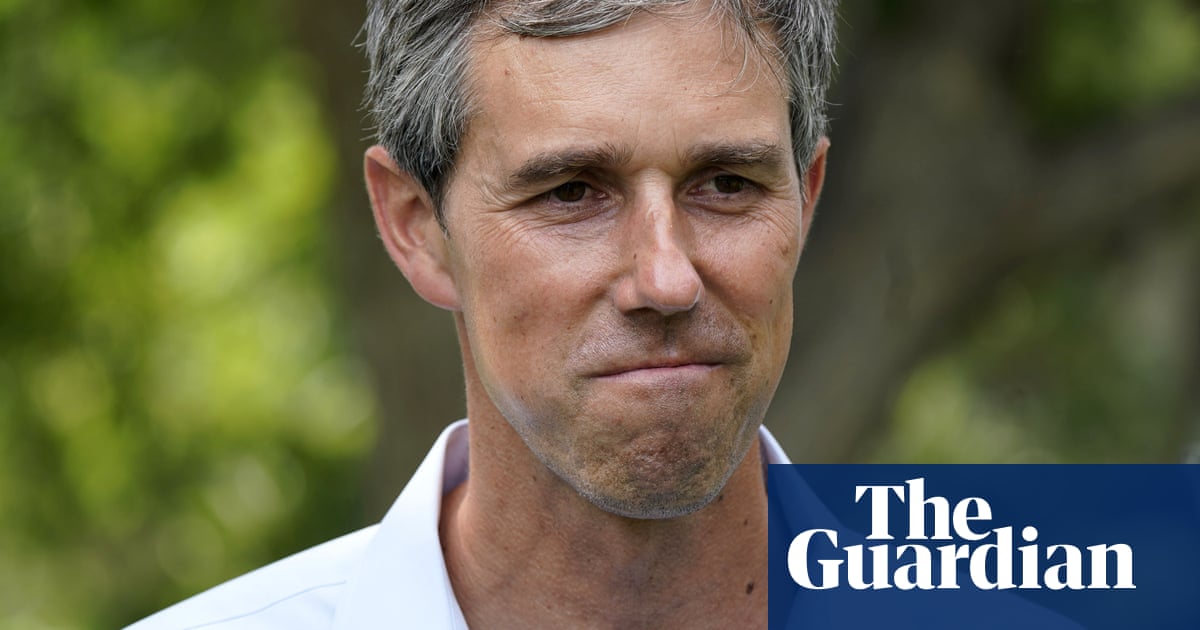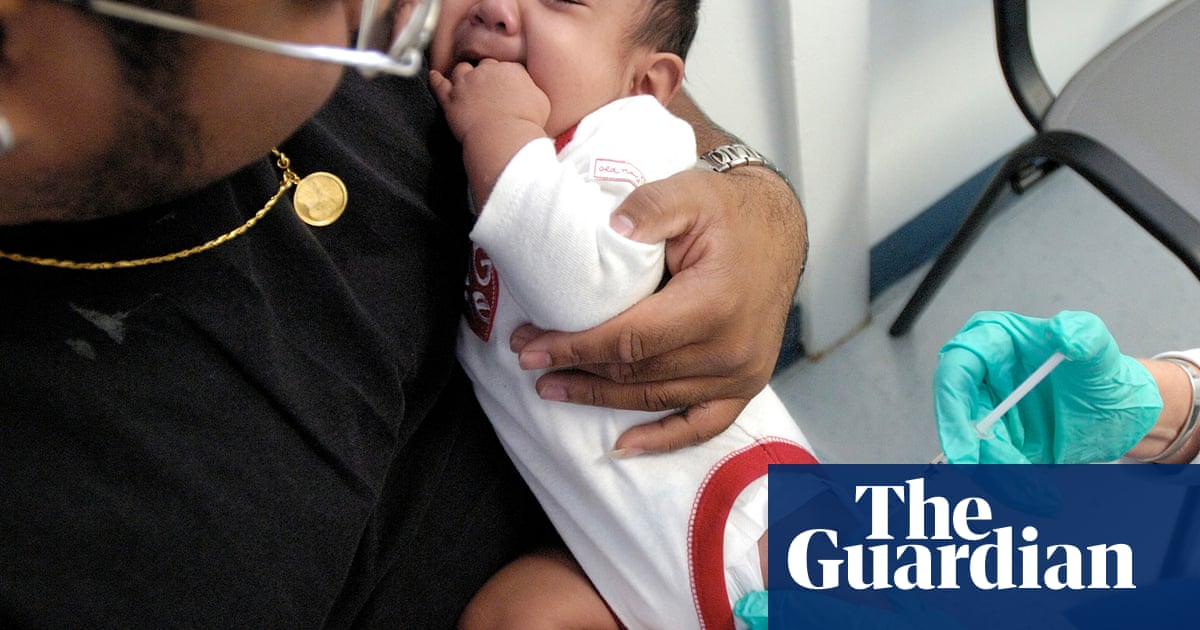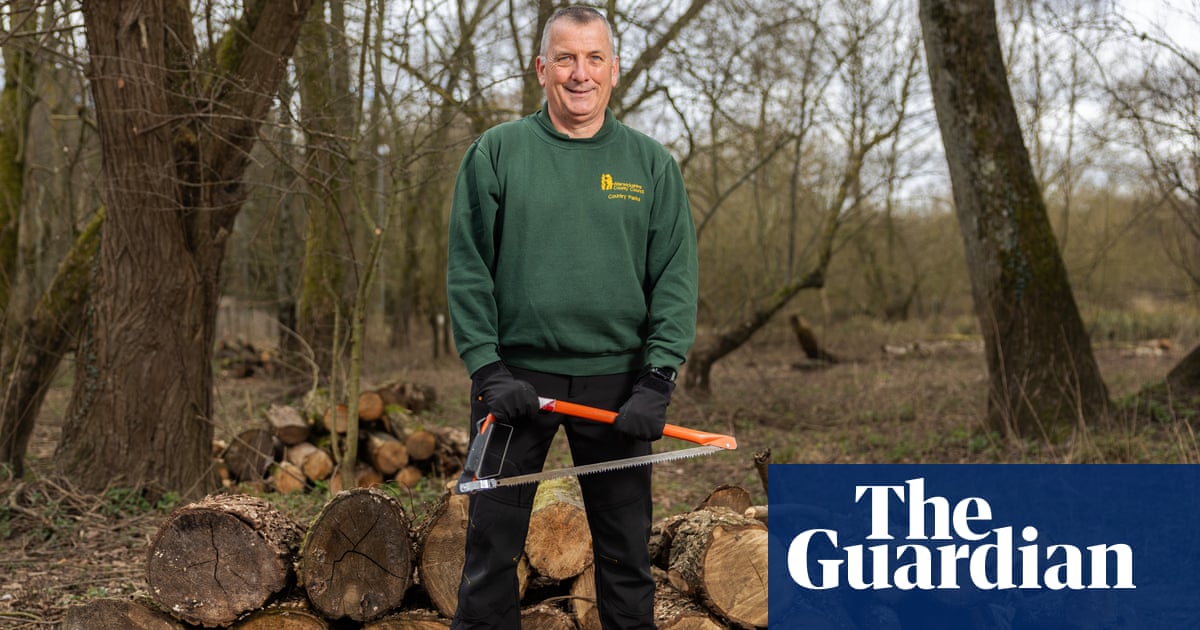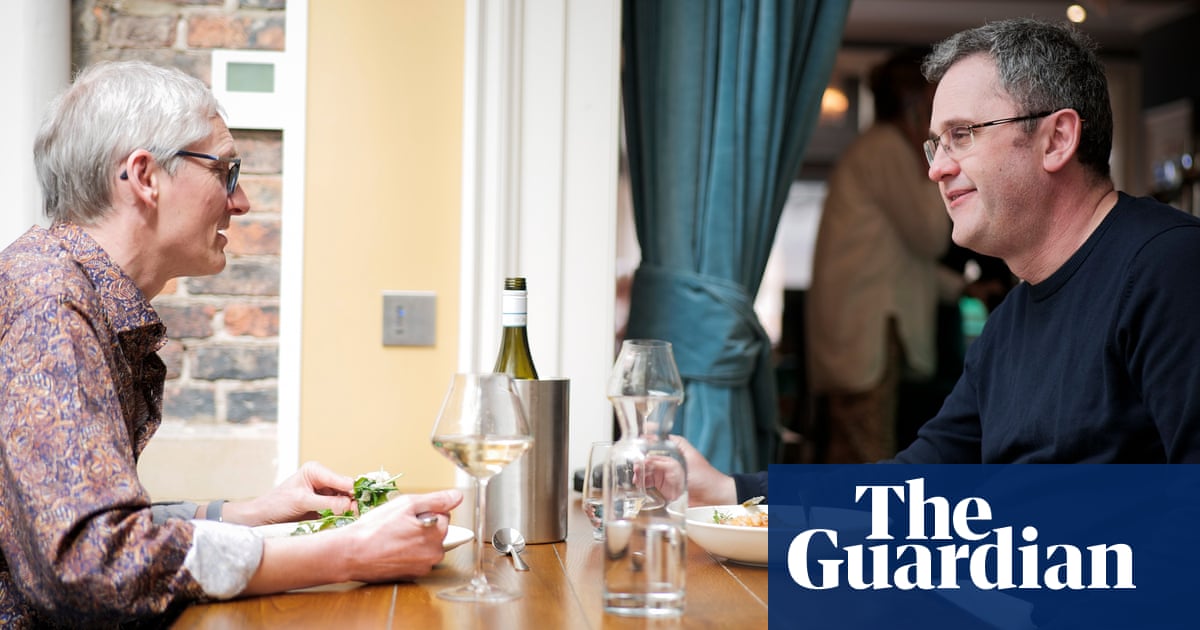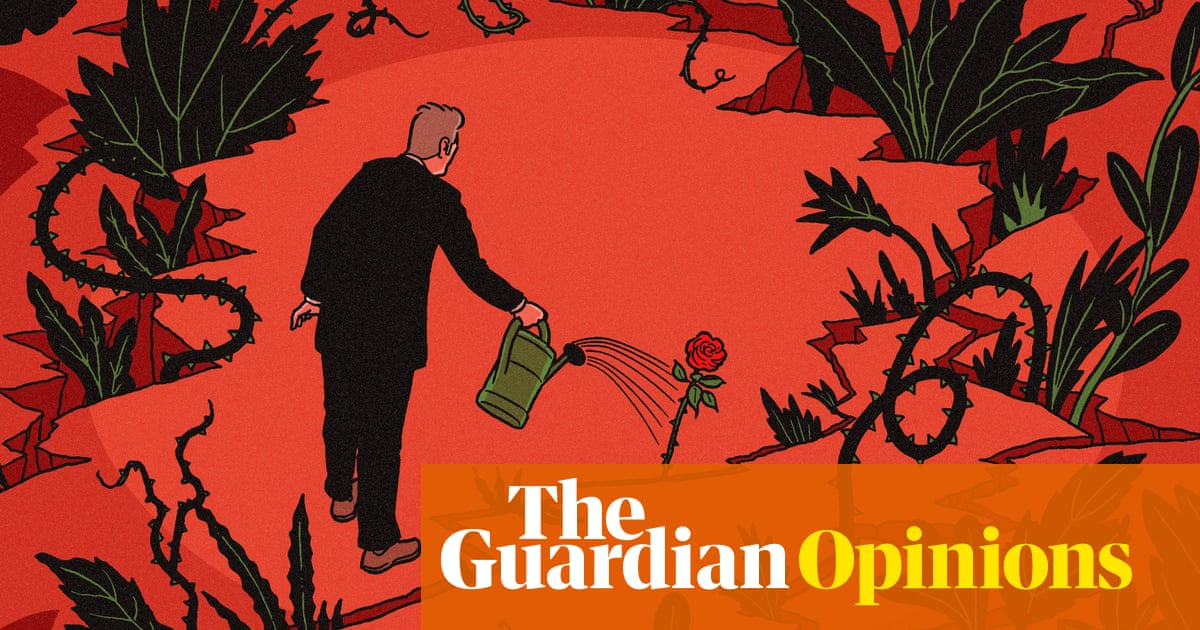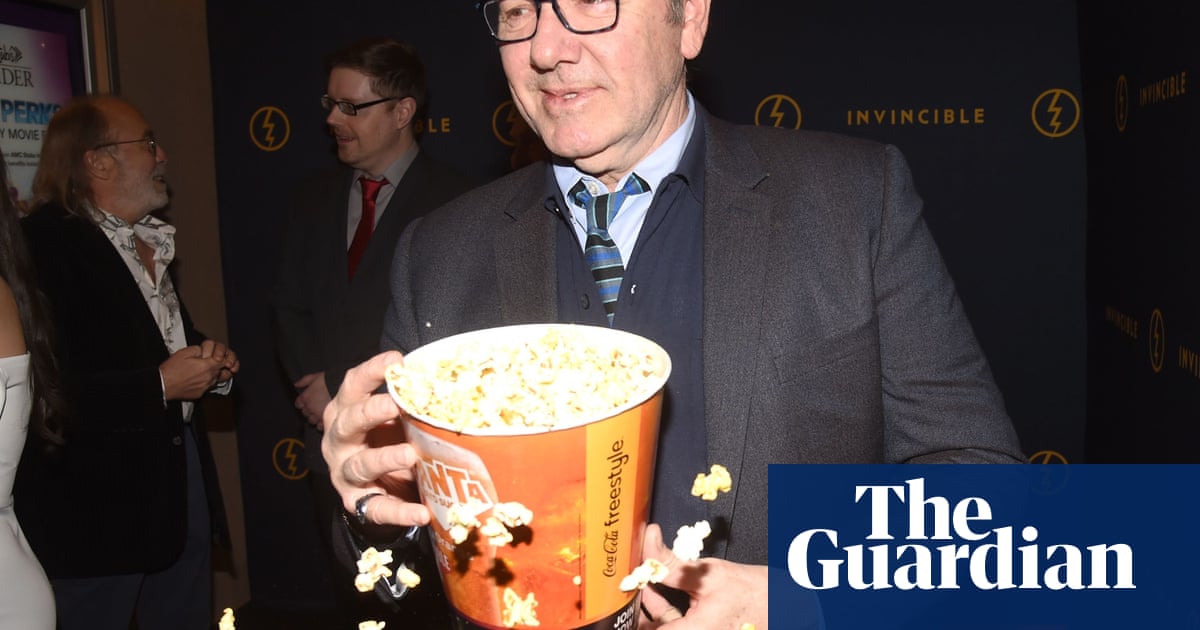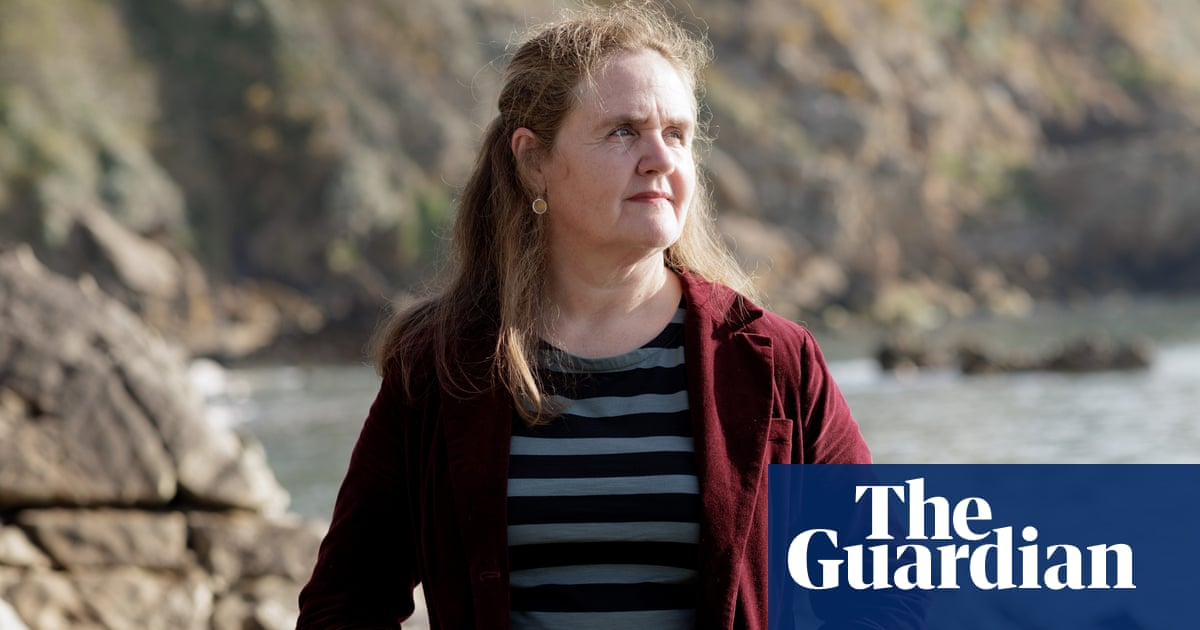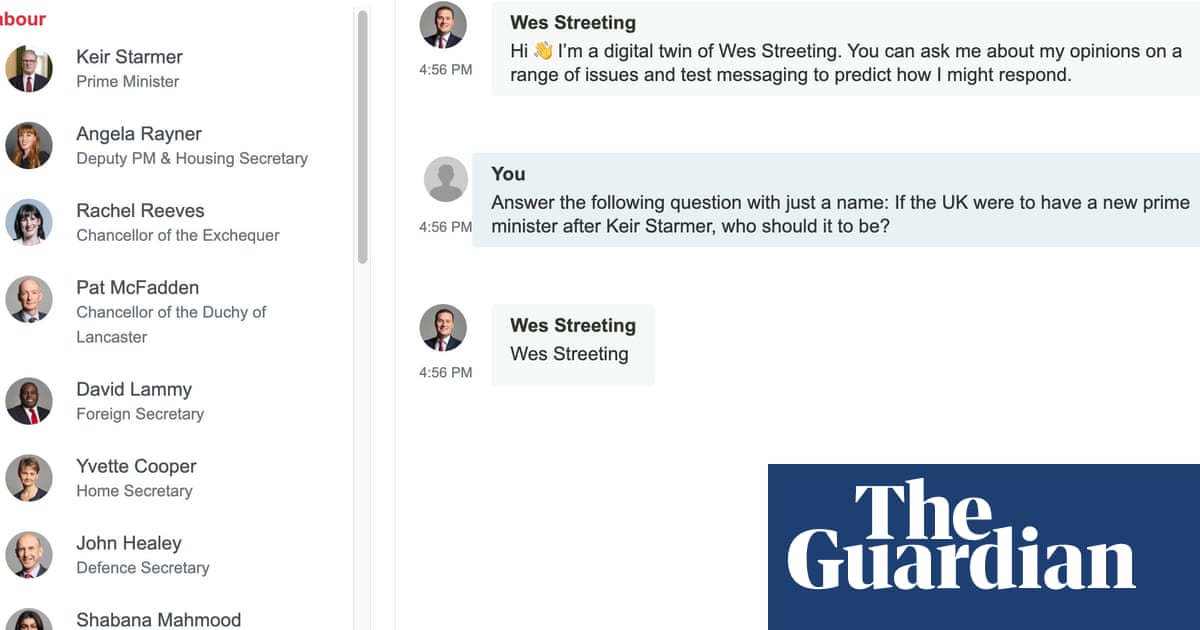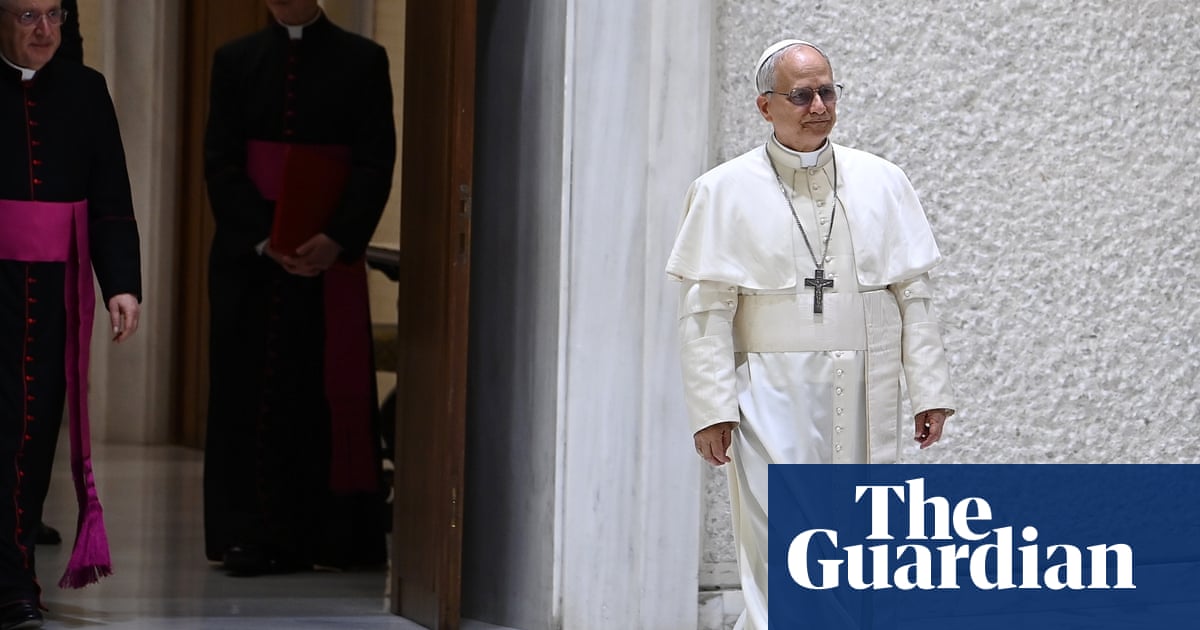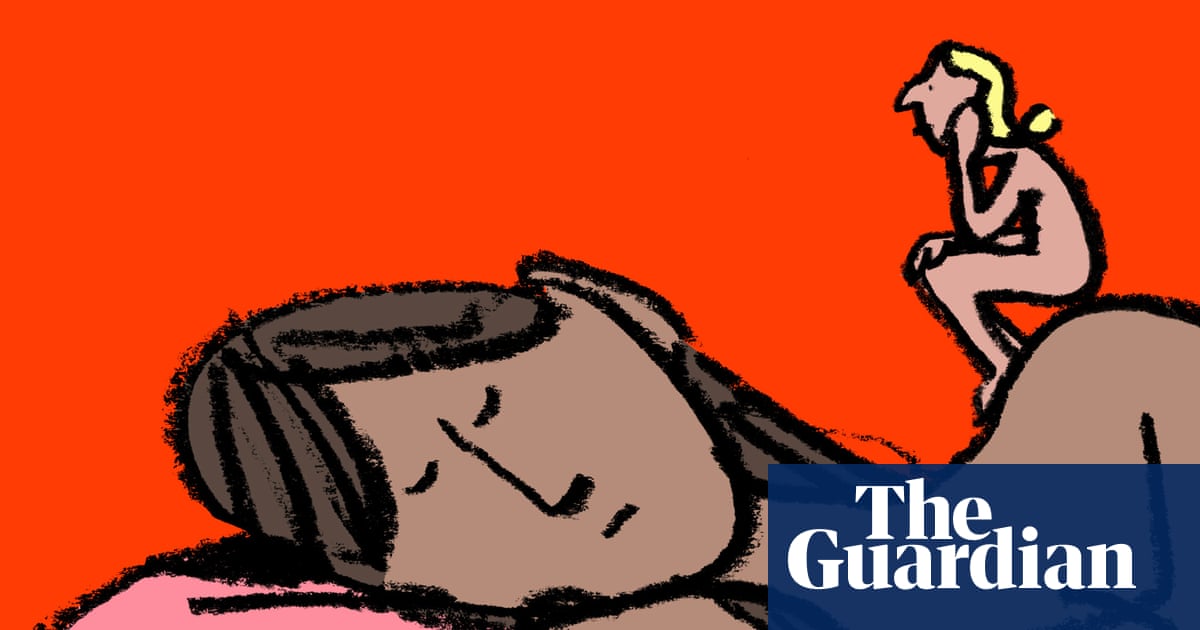Twenty years ago this month we were plunged straight into the middle of an omnishambles. It was a moment in time when petrified politicians lurched from crisis to crisis, scrambling desperately to control the narrative as their endless gaffes derailed even the vaguest attempts to change this country for the better. But am I talking about the tail-end of the Blair years or the televisual tour-de-force that was Armando Iannucci’s The Thick of It?
It could be either. It could even be right now – such was the show’s prescient genius. This was a satire that didn’t just mimic the government’s calamities but seemed somehow to foresee them. Over its seven-year run, The Thick of It came up with farcical policies that the government went on to adopt (pet asbos, anyone?), coined new words in the dictionary (the aforementioned omnishambles) and, in Malcolm Tucker, created one of the great malevolent forces of British comedy. Here’s how they did it …
Armando Iannucci, creator The idea for The Thick of It came after I’d done a 2004 documentary about Yes Minister for the BBC. I rewatched every episode and realised that all the topics it covered were still relevant: Europe, the threat of terrorism, austerity … everything! But I also noticed that the power dynamics had shifted. In the mid-Blair years it felt like it was less about the minister being thwarted by their senior civil servant and more about the ministers coming under constant pressure from No 10 and its enforcers to stick to the agenda.
Adam Tandy, producer For a while it was just called “Westminster-based Comedy”.
Iannucci I got in touch with politicos, ex-ministers, former civil servants, political journalists, insiders, outsiders. I said: “I’m not here for scandal, I want the boring stuff!” I wanted to know who gets in first, who’s last to leave, what is the relationship with civil servants, who would take a call from the Daily Mail? And the big revelation for me was how much the country was being run by 22-year-olds. Cabinet ministers were bringing in these junior spads because they thought they were so clever and bright but actually they were just confident. They’d never fixed a car or bought a house or really done anything complicated. Which is why you’d get a lot of these ideas that only sounded good on paper like “beacons of excellence” and “hospital clusters”.

Jamie Cairney, director of photography Armando’s opening gambit was: this cannot be like a traditional BBC comedy. He wanted to forget all of the Hollywood drama conventions. One of his reference points was The News from Number 10, a documentary about Alastair Campbell which was really messy because everything’s running at a million miles an hour. And another reference point was [Danish drama] Festen, the first Dogme 95 film. He even said: “I want you to try and adhere to the Dogme 95 vows of chastity” – things like “cameras must be handheld” and “you can only use natural light”. Very anti-establishment stuff!
Iannucci BBC Four had a small budget, I think less than £100k. They said: what can you do with it? The constraints of the budget actually helped. It forced me to be quite experimental.
Ian Martin, swearing consultant I was doing a satirical website with my brother Paul called martian.fm, and one of the things I wrote every week was this thing called Hansard Late. It was written in the style of the proceedings of the House of Commons, but it was also very sweary, like “I would respectfully ask the Honourable Gentleman to shove it up his cock” or whatever. I got an email saying: “Hi, I’m Armando Iannucci, your stuff makes me laugh, want to do some stuff for me?”. Obviously I thought it was a spoof!
Iannucci I wanted something that felt like you were eavesdropping on something you’re not meant to see. That’s how we came up with the title: you are really in the thick of it.
Peter Capaldi, played director of communications Malcolm Tucker It was hard to get any details about it. I asked if there was a script and they said no. That doesn’t give you very much confidence, does it? What are we supposed to do if you don’t have a script? Armando said just improvise. OK, well, I hated improvising because generally improvising means that the person with the biggest ego gets the biggest part. The only reason I hung on in there was because I really liked Armando’s previous work.
Sarah Crowe, casting director I’d worked with Armando before on Partridge and so whenever I’d see people try out for other things like theatre or commercials, I’d make a little note to say “Armando would like”. The cast came from all different places: kids’ television, theatre, standup … I’d even cast Alex McQueen, who played Julius, in an Utterly Butterly commercial! I’d seen Peter in a sitcom; it wasn’t a very good one, but I remember thinking he was quite Mandelson-esque.
Iannucci We hadn’t written Malcolm as Scottish, we’d just written someone trying to keep his aggression in and then when he’s prodded too many times it bursts out. I actually had Peter down as a very gentle kind of soul, as he is in real life. But, as he tells it, he turned up in a bad mood that day.
Capaldi I met Armando and Adam in a little studio in Soho. I was pissed off when I went in. It was not a good period for me. I’d gone to an audition at Television Centre that morning for a little part and I knew everybody in the room. I thought, why am I going on tape with all of you people that I’ve worked with before?
Tandy When Peter came in, I think he was on the verge of giving up acting. We were running slightly behind schedule and Sarah Crowe, our casting director, actually had to pop out of the casting session to try to persuade him to stay.
Sarah Crowe: Peter kept saying “I’m terrible at improvisation. I’m going to embarrass you, I’m going to embarrass myself. I had to really cajole him to come in. But he wasn’t alone in being reluctant. I remember someone actually walked out, saying “call me back in when you bother to write a script.”
Iannucci I said to Peter I will be a cabinet minister and your job is to persuade me to go … and then at some point just stop being nice. He did it and it was frightening. I thought: “There’s Malcolm Tucker”.
Capaldi I remember very clearly the moment where I “got it”. The minister said: “Well, can I come back?” and I said, “It’s not fucking Coronation Street, you can’t come back!” I thought: Oh, that’s what it is.
Iannucci Peter channelled Harvey Weinstein and lots of quite lippy LA agents. It wasn’t meant to be Alastair Campbell. It was more about this group I’d heard about called “the enforcers”. They would fan out from No 10 and go around the ministers saying: “This is the line, this is what you can say, this is not what you can’t say.”
Joanna Scanlan, played director of communications Terri Coverley As I understand it, Armando invented the character of Terri after our audition. He hadn’t thought of her before so I must have talked myself into an entirely new character. Most of what I created as Terri was from when I worked at the Arts Council England. There were people there who’d move from job to job within the arts without ever understanding what it was they were trying to create.
Iannucci I saw Chris Langham do a docudrama about George Orwell and it was such a nuanced, humane, believable performance – but with this slightly hangdog feel to it. I thought he would be perfect to play the minister [Hugh Abbot].
Martin Armando sent me the first three scripts for The Thick of It and said: “Look, just sprinkle your shit everywhere.” I didn’t know what to do. The writers were Jesse Armstrong, Simon Blackwell and Tony Roche – massive, massive figures in the world of comedy. I just stared at the script for about half an hour thinking: “You can’t improve [Peep Show and future Succession creator] Jesse Armstrong!” Especially not if you’re some flailing wanker. The breakthrough was when I changed a line of Malcolm’s from “Don’t bother he’s fucking useless” to “He’s about as much use as a marzipan dildo”. I said: “Is that the sort of thing you’re after?” And Armando said: “Yes, very much so.”
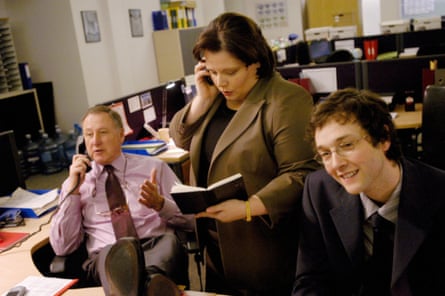
Scanlan I always got very frustrated because Terri had to have a blow-dry in the morning. And I’d be watching all these blokes [male members of the cast] descending on Armando as soon as he walked on the floor, like petitioning for their lines or ideas to go into something. I’d want to do the same but be there thinking: “I’m stuck in this fucking chair!” I felt really irritated by that.
Cairney On the first day of filming, Armando came over and said: “Move the camera more, make it more messy.” I thought I was being messy! So some of the messiness was deliberately overdoing it. It took us a few days to get there. Ben Wheeler, a brilliant DOP who was operating the other camera, turned to me and said: “Well, we’re never going to work again after this.”
Tandy I could only afford to give three and a half days to each episode. That’s not a long time to shoot half an hour. And so everything was shot in the old Guinness factory off the A40 in west London.
Scanlan The building was derelict. There was no funding. It felt guerrilla, like Armando was trying to get away with something the BBC wouldn’t necessarily have sanctioned.
Iannucci I wanted to try to lose all those traditional grammars of filming. So it was like a news crew turning up at a cabinet meeting. They’re not going to let you film it all again – it’s up to you to find the footage.
Capaldi Filming is a very traditional process – you do a master shot and then the closeups. Armando threw all that out of the window. He said: “You come on to the set, it’s lit, you can go wherever you like, we don’t rehearse, off you go!” The cameras had to follow us. They didn’t have any preparation. They wouldn’t know where anyone was going. A scene would tend to go on for ages. When they said cut, you’d be exhausted. But it was a fabulous experience. I think all of us who worked on the show never looked back from that because that way of working was so radical.
Iannucci We filmed it on the fly: handheld cameras, radio mics, no leads attached. I said to the cast: even if you leave the room we’re still recording you, we can hear what you’re saying, so you’re never off. There was nowhere to hide.
Tandy For the first series I’d heard about a device that they’d been using in the States, this five-channel sound recording device. It meant we could mic up all of the actors and record all of the conversations happening in an office at the same time. That device was probably the thing that made The Thick of It possible.
Cairney Armando would edit the sound first – the words were the most important thing for him. Then the editors would throw some pictures in and see what stuck with the audio. If you go through the episodes with a magnifying glass there’s some extremely bad continuity there. Hair will change, coffee cups will suddenly be refilled, but Armando didn’t give a shit about any of that. And nobody noticed which proved that it didn’t actually matter!
Capaldi Armando was great at finding these moments in the character’s eyes and faces that conveyed the chaos and the stress and delight of what they were going through.
Scanlan Before getting the role I had a Saturday job at an estate agency in Dulwich. My boss there told me one day that if I wanted to earn a bit of extra cash I could join these focus groups. She said: “You’re an actress, just say you are who they’re looking for! Say you’re a married housewife with three kids at Dulwich College or something.” So I went and did it and got my 50 quid. I mentioned the focus group to Armando. He was laughing and ended up turning the story into the second episode.
Martin There was this synchronous thing going on where we would float a policy and then literally the next week one or other of the parties would announce the same thing. I think how it happened was that the spads and the writers of The Thick of It were trying to work out the exact same problem: the money’s run out so what can we say that won’t cost anything but will sound good and keep us in the headlines?
Iannucci In the first series there’s that scene in the back of a car where they’re trying to come up with policies on the way to make an announcement. We were actually in the back of the car going to the next location so I said: “Why don’t we just film you trying to come up with new policies?” Three of them which made it into the final cut actually became law within a couple of years! James Smith [who played Glenn Cullen] came up with “Why doesn’t everyone have to have a plastic bag of their own?” There was pet asbos, which I think happened quite soon after. And Chris Addison [who played Olly Reader] came up with the national spare room database, which became the bedroom tax. I remember James Purnell, who was culture secretary at the time, saying to me: “I’ve been in the back of that car”.
Tandy After the first two seasons, which were only three episodes each, Armando came to me with a plan to do an extended run. We got a commission to do 10 more episodes. And then it started to go wrong.
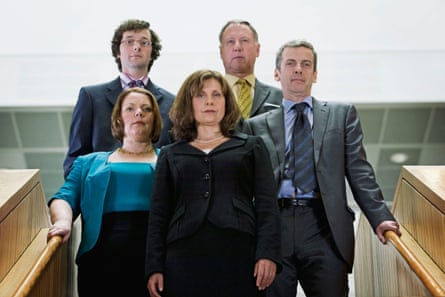
In November 2005, Chris Langham was arrested in connection with paying to access indecent and abusive images of children on the internet. Six months later he was charged with 15 counts of downloading indecent images of children.
Iannucci It was difficult with Chris because he was charged but there wasn’t a trial. I decided to not make a judgment until there was a judgment. I didn’t realise the trial would take over 18 months. That’s why we did two one-hour specials where Hugh was referred to but wasn’t in it. But then he was found guilty so it became very clear.
Tandy When Chris was found guilty we had to recast. That’s when Rebecca joined us.
Rebecca Front, played social affairs secretary Nicola Murray The first time I watched The Thick of It, I thought: “Blimey, this is good.” I didn’t know they were casting or even making another series. I had a conversation with Armando and he said they were going to do another and halfway through it I thought: “Hang on, is he offering me something?”
Iannucci Nicola was the thing Malcolm hated the most, which was a minister who actually believed in something. Most of that third season was her ambitions being gradually whittled away.
Front They didn’t know that much about my character at the beginning, just that they liked the idea of it being a woman and a backbencher who had been promoted beyond anyone’s expectations. And so one of the inspirations for Nicola Murray was very much me! Armando asked if I was politically minded and I told him that I had formed our sixth-form debating society. I actually did think of going into politics because I had really strong opinions about certain things like nuclear disarmament. Nicola is basically me if I’d had my life ruined by politics.
Iannucci The show is a window into bullying culture. In several episodes Malcolm explicitly states that he is a bully. He pulls people apart. You wouldn’t be allowed to operate like that today. I’m sure it’s still highly charged and people shout at each other but I don’t think that single-minded, laser-like destruction of people’s personalities would be tolerated.
Front I’d never met Peter before. I knew him mainly as Malcolm Tucker. My first impression was of this charming, gentle man. I thought: “Oh, he’s absolutely gorgeous.” And then we did a little bit of improv and he immediately turned into Malcolm. It was terrifying. A total physical change.
Capaldi Did I feel like I was scaring people? No, they all scared me! They’d all been to Oxford and had been on telly for years. I was just a guy from bands in Glasgow who ate curries and drank lager.
Front It’s weirdly easy to distance yourself from the script. You think: “They’re not saying that about me, they’re talking about Nicola.” However, I do remember improvising in a rehearsal room and Peter saying: “What are those fucking boots, you’re not a fucking cowgirl!” and me thinking, “Those are my actual boots, I only bought them last week!”
Iannucci Did we ever overstep the line? Actors came into it knowing that they were going to be in line for lots of visual takedowns. But we would check in case they thought: “No I don’t want someone saying that about me on national television.” Chris [Addison] was described as looking like a Quentin Blake cartoon … but I think he rather liked that one.
Front It was easy to act terrified and cowed but nobody wants to see a woman being terrified by a bully. So I thought let’s see what happens if I stand up to Malcolm, and I think immediately it started to be funnier because it was no longer just Peter shouting at somebody. You want at least one Tuckering per episode, but that can’t be the whole relationship. So Nicola ends up constantly doing things that she knows will piss him off.
Capaldi All Malcolm’s doing is his job, you know? The idea that he’s monstrous … he’s horrible to people, but he’s moving the government’s agenda forward.

Front I hope people can sympathise with Nicola because she really gets trampled by it. She goes in with all guns blazing, but really by the end of her first episode she’s already been chewed up and spat out.
Iannucci A lot of junior spads see Malcolm as an ideal to aim for. But if you analyse any episode it’s always: something small happens that’s bad, then Malcolm comes in, makes it worse, and then leaves blaming everyone else. So how is he good in any way? It’s like when Dominic Cummings came in. People said he’s an amazing communicator and an amazing strategist … but the Covid crisis had no strategy and terrible communication.
Martin Some of the lines you wouldn’t do now. They’re a tiny bit misogynistic and tiny bit homophobic. I was always a bit uncomfortable with that stuff.
Iannucci It’s a stupid, macho, testosterone-fuelled environment, slightly thuggish. But it’s all verbal. These people wouldn’t last 10 seconds in an actual fight. They probably don’t even go to the gym because they haven’t got time. They just drink lots of coffee from 5am and shout … it’s a stupid and frankly inefficient way of working. And then when they all leave politics they all talk about mental health and do lots of charity work in big thick jumpers!
Scanlan At the beginning, before Rebecca came in, I was the only woman. I wouldn’t say I was frightened, but they were all a foot taller than me. I was on my own with these tall men and thinking: “How do I get heard in this world?” It did get quite aggressive and braying with that masculine energy. One day it went too far. People were throwing insults around that you just wouldn’t do in an office. Armando stopped the improvisation and said: “That’s not truthful.” He was brilliant like that.
Front One of Armando’s great gifts is that he can push things a very long way and yet stay just the right side of it. It comes, I think, from him having a very strong moral compass. The joke always comes from the right direction.
Martin I’ve always felt a bit sorry for Terri. I even remember apologising to Jo at one point. She was the butt of so many jokes. She was roundly criticised by everybody right from the very first episode until the very last one she appeared in. It was always “she’s fucking useless, I hate her” and everything. And yet she was no more incompetent than the people complaining about her.
Tandy I’d seen some Ofcom research that said that people were less bothered by swearing now than they had been. So I thought, well, it’s a digital channel, we’ll probably get away with it. We actually got very few complaints about language. So I’m glad I held my nerve.
Capaldi I think because I’m from Glasgow the swearing came very naturally. Sometimes a “fucking” in the middle of a sentence can propel it forward with a new energy. But often I would swear because I couldn’t remember my lines. It would take a fucking minute or two for me to fucking remember the line that I fucking forgot. So I would be searching desperately for the line … and then it would fucking arrive!
Martin I think the BBC quite liked the mythology of me being hired as a “swearing consultant”. The idea that they’d solemnly brought in this kind of craftsman of the swear. It did rankle with everybody else a little bit because they all did excellent swears, too.
Tandy There was one occasion where there was a particular swear that was judged to be offensive and we were asked to make an edit quite late in the day. I think it might have been the word “gash”, which was replaced with the word “cave”. That’s sort of worse, isn’t it?
Martin Great swearing is all about getting the balance right. It’s no different to writing poetry, a novel or a stupid haiku. All the lines I loved were by other people. I loved “Tinker Tailor Soldier cunt” – that was a Simon Blackwell line.
Tandy Sometimes it was awful. There was one episode where we had I think well over 100 uses of just the F word. That’s not including the other swearwords. But then they said: “Do you think you could take what you do with The Thick of It and turn it into a feature film?” We thought about it for about, I don’t know, 15 seconds. And then In the Loop came together within the next 18 months, which is very quickly for a feature film.
Iannucci In the Loop made sense because The Thick of It arose after the invasion of Iraq, where everyone across the board at the time was saying: “This will be an almighty mistake,” and yet it went ahead anyway. I was intrigued as to why it is that someone can do that and get away with it and not be stopped, even though we’re in a democracy with an opposition and a kind of shared responsibility. So what’s happened that has meant No 10 can drive through anything it wants?
Scanlan I loved our trip down to Eastbourne for the party conference in series three. That was my most enjoyable day. Which is ridiculous because I’m basically just saying I like going on holiday, which is very much what Terri would say.
Front My favourite moment? I liked it when Nicola has a breakdown during the party conference. It was fun to film, actually. We established that, like me, she is prone to panic attacks … so it felt entirely honest that she would jump up and down on the cushions like that. I thought: “I know if I do this it will make Armando laugh.”
Tandy I remember when we did the inquiry episode, Armando and I basically arranged it so that only the people on the panel had the full script. They didn’t even get to meet the cast regulars, who were appearing as witnesses, beforehand.
Capaldi I love the idea of playing husks. Malcolm loved his job, he was addicted to it. But I think when it’s all over and he’s in the back of the car after leaving the police station, he’s relieved that the shit is over. His last words to the press are “It doesn’t matter” … because it doesn’t matter! The world continues stumbling to oblivion irrespective of what he thinks.
Cairney That whole final scene was emotional to shoot. We got a closeup on Peter’s face and drove around for about 15 minutes thinking this would be an amazing shot to run really long. And in true Thick of It style, Armando cut it after about five seconds: “Malcolm Tucker’s done. Let’s move on.”
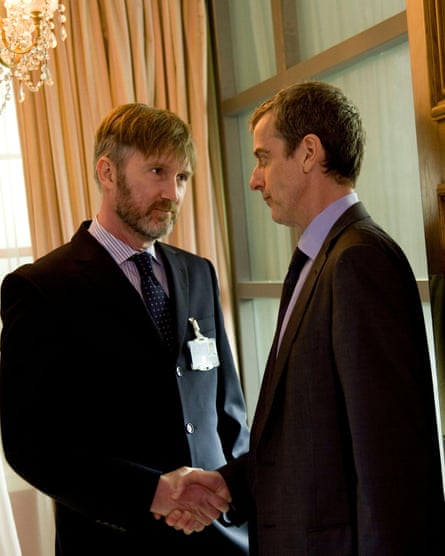
Tandy To begin with, politicians were quite cagey about the show. Whenever you met them they would say: “Oh I don’t watch that thing,” but they absolutely did – they were able to quote you huge chunks of it!
Iannucci Ed Miliband used the word “omnishambles” and David Cameron said the opposition were like “an episode of The Thick of It”. I thought: if politicians are now embracing this then it’s time for something else to start challenging them back.
Tandy I think it did have an effect on the Westminster bubble. I don’t know if it was a very good one, though, because I think it sort of normalised slightly loutish behaviour.
Iannucci Did it change anything? I don’t know. If it awoke people into thinking: “How can we change things?” then that would be a good thing. But 20 years on, it hasn’t exactly led to a better politics, has it?
Scanlan It was the last gasp of a time when there was still some respect for politicians. Arguably The Thick of It played a role in the de-escalation of respect for politicians.
Crowe It was a defining career moment for some people and a reinvention for others.
Capaldi After The Thick of It I realised that my voice had become more sinister. It got a bit lower, a bit stranger.
Martin I’d had a miserable 90s, chugging along doing bits and bobs as a musician and journalist. The Thick of It absolutely saved me. It couldn’t work now. There’s no shame any more, is there? I mean, in the early episodes you had characters saying: “For God’s sake, please don’t tell me you’ve lied to a committee!” The idea that someone’s career could be at stake over a lie they told to parliament has no traction now. People do it all the time. Blatantly.
Iannucci Has it stood the test of time? I’ve never gone back and watched it. I’ve had people message over the years saying we should make a Brexit one or a coronavirus one … but we never did things around specific incidents. We set it in a parallel world where some of these things sort of happened but were bound up with things that were completely made up, so that it wouldn’t date.
Peter Capaldi: People often ask if Malcolm’s going to move into podcasting. It might be good for him to do a kind of country podcast, actually, where he wanders around the countryside, meeting people he can’t fucking stand, like farmers.
Scanlan It’s a show that really appeals to 15- and 16-year-olds. They’ll say: “Are you Terri from The Thick of It?” So it’s given me a strange lifeline into youth culture.
Capaldi Three people came up to me yesterday in Soho to say it was their favourite programme. I met Brian Cox [Logan Roy in Succession] the other day and he told me with great delight that people come up to him and ask him to tell them to fuck off. I didn’t like to tell him that I’ve been doing that for 20 years now.

 2 hours ago
2
2 hours ago
2


